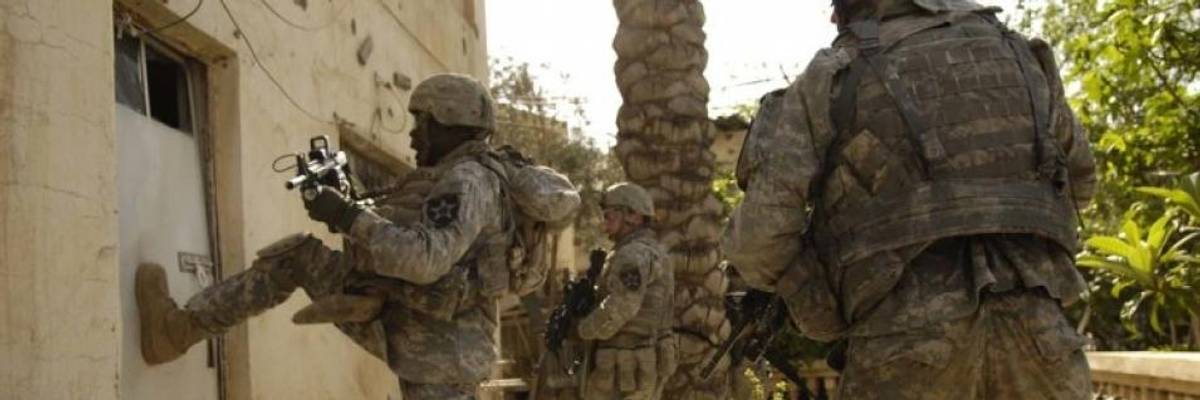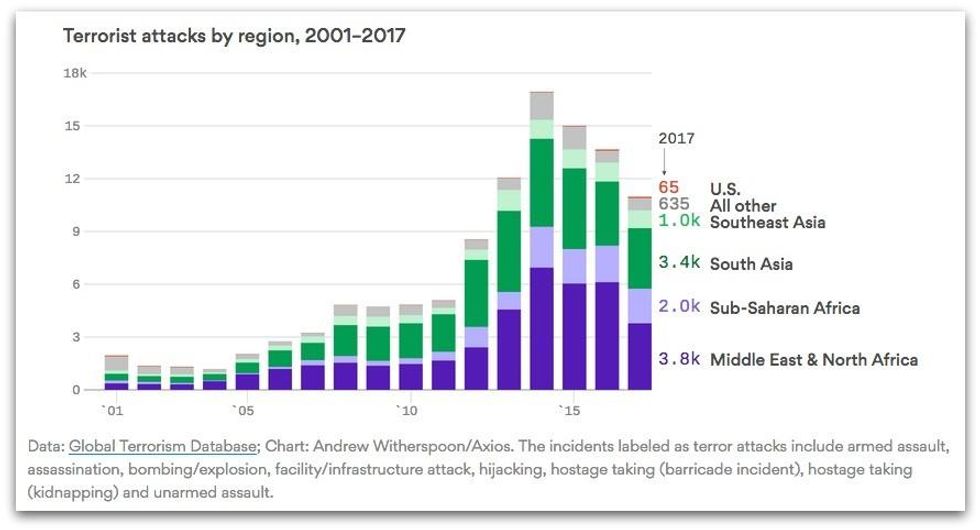

SUBSCRIBE TO OUR FREE NEWSLETTER
Daily news & progressive opinion—funded by the people, not the corporations—delivered straight to your inbox.
5
#000000
#FFFFFF
To donate by check, phone, or other method, see our More Ways to Give page.


Daily news & progressive opinion—funded by the people, not the corporations—delivered straight to your inbox.

A U.S. Army Soldier from the 1st Stryker Brigade Combat Team kicks in the door of a building during a cordon and search in Buhriz, Iraq, March 14, 2007. (Photo: Flickr / U.S. Air Force photo / Staff Sgt. Stacy L. Pearsall)
In the 17 years since the events of Sept. 11 2001, after which the United States declared a "global war on terror," there has not been a terrorist attack of similar size or magnitude on American soil.
However, according to findings in a new congressionally mandated report by the United States Institute of Peace--authored by members of a federal task force focused on extremism--nations around the world have suffered a five-fold increase in terrorist attacks following the post-9/11 policies unleashed by the U.S. and its allies.
The focus of the report--titled Beyond the Homeland: Protecting America from Extremism in Fragile States--maintains a very U.S.-centric worldview. And while it does little or nothing to critically challenge the widely criticized policies pursued by the Bush, Obama, or Trump presidencies, its tabulation of the dramatic rise in destablized states and growing terrorist violence throughout the regions where the U.S. military has been most active since 2001--namely, the Middle East and North Africa, South Asia, and Sub-Saharan Africa--is nonetheless revealing.

That the so-called "global war on terror" is, in fact, creating more terrorists than it eliminates is not news. Even the CIA has admitted that.
But 17 years after that fateful and horrifying day--and with the people of Syria, Iraq, Afghanistan, Libya, Somalia, Pakistan, Ethiopia, Chad, Yemen, and many other countries still being forced to suffer the consequences of a nearly borderless, limitless war--it remains important to once more document the futility of violence as being a solution to... violence.
Dear Common Dreams reader, The U.S. is on a fast track to authoritarianism like nothing I've ever seen. Meanwhile, corporate news outlets are utterly capitulating to Trump, twisting their coverage to avoid drawing his ire while lining up to stuff cash in his pockets. That's why I believe that Common Dreams is doing the best and most consequential reporting that we've ever done. Our small but mighty team is a progressive reporting powerhouse, covering the news every day that the corporate media never will. Our mission has always been simple: To inform. To inspire. And to ignite change for the common good. Now here's the key piece that I want all our readers to understand: None of this would be possible without your financial support. That's not just some fundraising cliche. It's the absolute and literal truth. We don't accept corporate advertising and never will. We don't have a paywall because we don't think people should be blocked from critical news based on their ability to pay. Everything we do is funded by the donations of readers like you. Will you donate now to help power the nonprofit, independent reporting of Common Dreams? Thank you for being a vital member of our community. Together, we can keep independent journalism alive when it’s needed most. - Craig Brown, Co-founder |
In the 17 years since the events of Sept. 11 2001, after which the United States declared a "global war on terror," there has not been a terrorist attack of similar size or magnitude on American soil.
However, according to findings in a new congressionally mandated report by the United States Institute of Peace--authored by members of a federal task force focused on extremism--nations around the world have suffered a five-fold increase in terrorist attacks following the post-9/11 policies unleashed by the U.S. and its allies.
The focus of the report--titled Beyond the Homeland: Protecting America from Extremism in Fragile States--maintains a very U.S.-centric worldview. And while it does little or nothing to critically challenge the widely criticized policies pursued by the Bush, Obama, or Trump presidencies, its tabulation of the dramatic rise in destablized states and growing terrorist violence throughout the regions where the U.S. military has been most active since 2001--namely, the Middle East and North Africa, South Asia, and Sub-Saharan Africa--is nonetheless revealing.

That the so-called "global war on terror" is, in fact, creating more terrorists than it eliminates is not news. Even the CIA has admitted that.
But 17 years after that fateful and horrifying day--and with the people of Syria, Iraq, Afghanistan, Libya, Somalia, Pakistan, Ethiopia, Chad, Yemen, and many other countries still being forced to suffer the consequences of a nearly borderless, limitless war--it remains important to once more document the futility of violence as being a solution to... violence.
In the 17 years since the events of Sept. 11 2001, after which the United States declared a "global war on terror," there has not been a terrorist attack of similar size or magnitude on American soil.
However, according to findings in a new congressionally mandated report by the United States Institute of Peace--authored by members of a federal task force focused on extremism--nations around the world have suffered a five-fold increase in terrorist attacks following the post-9/11 policies unleashed by the U.S. and its allies.
The focus of the report--titled Beyond the Homeland: Protecting America from Extremism in Fragile States--maintains a very U.S.-centric worldview. And while it does little or nothing to critically challenge the widely criticized policies pursued by the Bush, Obama, or Trump presidencies, its tabulation of the dramatic rise in destablized states and growing terrorist violence throughout the regions where the U.S. military has been most active since 2001--namely, the Middle East and North Africa, South Asia, and Sub-Saharan Africa--is nonetheless revealing.

That the so-called "global war on terror" is, in fact, creating more terrorists than it eliminates is not news. Even the CIA has admitted that.
But 17 years after that fateful and horrifying day--and with the people of Syria, Iraq, Afghanistan, Libya, Somalia, Pakistan, Ethiopia, Chad, Yemen, and many other countries still being forced to suffer the consequences of a nearly borderless, limitless war--it remains important to once more document the futility of violence as being a solution to... violence.